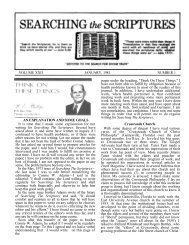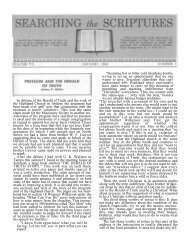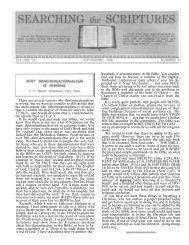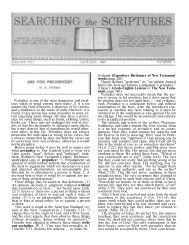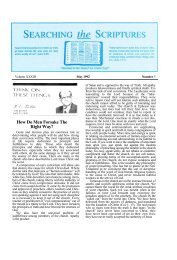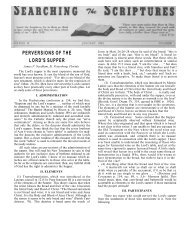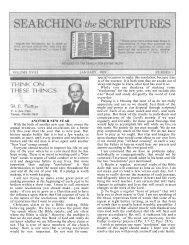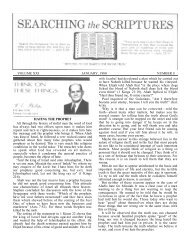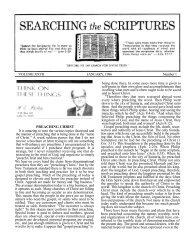Volume 29 – 1988 (PDF) - Searching The Scriptures
Volume 29 – 1988 (PDF) - Searching The Scriptures
Volume 29 – 1988 (PDF) - Searching The Scriptures
Create successful ePaper yourself
Turn your PDF publications into a flip-book with our unique Google optimized e-Paper software.
Page 8<br />
WHAT IT MEANS TO BE A CHRISTIAN<br />
Ask the question "What is a Christian?" and many<br />
will answer by outlining the steps that must be taken in<br />
order to become one. This is akin to explaining what the<br />
president of the United States is by describing only the<br />
election and inauguration process. Surely there is more<br />
to understanding the meaning of life in Christ than<br />
memorizing the "first principles." In a familiar passage,<br />
we are admonished to go beyond the fundamentals to<br />
spiritual maturity: "<strong>The</strong>refore leaving the principles of<br />
the doctrine of Christ, let us go on to perfection" (Heb.<br />
6:1).<br />
We sometimes also make the mistake of discussing<br />
the meaning of being a Christian solely in terms of the<br />
Christian's conduct. To be sure, discipleship is an<br />
active matter, not just an honorary status one enjoys.<br />
But what the Christian is is no less important than what<br />
he does. In fact, the key to doing the right thing is being<br />
the right person. Deeds are to character what fruit is to<br />
a tree. When we come to grips with what it means to be<br />
a Christian, we will find that right behavior takes care<br />
of itself.<br />
Fellowship. <strong>The</strong> heart of the matter is that the<br />
Christian is a person who is in fellowship with God, his<br />
Creator. In place of his old alienation, he now enjoys<br />
"reconciliation." In sin and apart from Christ, a man is<br />
"without God in the world" (Eph. 2:12). But forgiven of<br />
sin and in Christ, one is at peace again with God. "For if,<br />
when we were enemies, we were reconciled to God by the<br />
death of his Son, much more, being reconciled, we shall<br />
be saved by his life" (Rom. 5:10). <strong>The</strong> condemnation of sin<br />
having been done away, it can be said that "our<br />
fellowship is with the Father, and with his Son Jesus<br />
Christ" (1 Jno. 1:3).<br />
Because he is in fellowship with God, the Christian<br />
shares life with God. In the language used to describe the<br />
communion of men like Enoch and Noah with God, the<br />
Christian "walks with God" (cf. Gen. 5:22; 6:9). Looking<br />
at it in a slightly different way, the Christian is a person<br />
who comes to "know" God. Jesus prayed to his Father,<br />
"And this is life eternal, that they might know thee the<br />
only true God, and Jesus Christ, whom thou has sent"<br />
(Jno. 17:3). At the practical level, that means the Christian<br />
is one who thinks often about God, studies eagerly<br />
the word of God, meditates on the character of God,<br />
rejoices in the approval of God, and thrills continually at<br />
the prospect of heaven with God. <strong>The</strong> Christian lives life<br />
"near to the heart of God."<br />
Commitment. Not only is the Christian a person in<br />
a reconciled relationship to God, he is a person who has<br />
wholeheartedly devoted his will to that of his Lord. He<br />
has committed himself to total obedience to Jesus<br />
Christ. In a sense, 1 Pet. 3:15 contains the crux of<br />
Christian living: "But sanctify the Lord God in your<br />
hearts." <strong>The</strong> actual authority of God is immutable—his<br />
Son is Lord of lords and King of kings. But, while others<br />
do not, the Christian acknowledges the authority of<br />
Christ. He enthrones Christ in his heart as the Lord that<br />
he deserves to be. One cannot talk any more fundamentally<br />
about being a Christian than to talk about the<br />
lordship of Christ. <strong>The</strong> Christian pays a good deal more<br />
than lip service to that principle.<br />
Too, the Christian's commitment to the Lord's will<br />
has to do with more than just the work and the worship<br />
of the church. All of his conduct is submitted for the<br />
Lord's approval, not only those parts that are connected<br />
to the collective "teamwork" of God's people. In his daily,<br />
individual activity, as much as in what he does at the<br />
church building, the Christian is seeking to do all the<br />
Lord's will, and only the Lord's will. Colossians 3:17 ("do<br />
all in the name of the Lord Jesus") is the banner over the<br />
entirety of his life's activity. He takes not a single step,<br />
as an individual or with the church, without being able<br />
to give thanks for the Lord's approval.<br />
Character. A Christian, in short, is a person who is<br />
being transformed into the likeness of God's own character.<br />
He is a "partaker of the divine nature" (2 Pet. 1:5), a<br />
person who is in the process of becoming conformed to<br />
the very holiness of God. Peter wrote "But as he which<br />
hath called you is holy, so be ye holy in all manner of<br />
conversation; because it is written, Be ye holy; for I am<br />
holy" (1 Pet. 1:15,16). Learning not merely the Book of<br />
God, but the God of the Book — in order to share the<br />
divine character — that is what being a Christian is<br />
about.<br />
Seen that way, obedience to the instructions of God is<br />
no burdensome task. <strong>The</strong> Christian's highest joy is to<br />
please the Father whom he loves. To do what God wants<br />
— to be as God is — is the noble aspiration that<br />
motivates every thought and word and deed of the new<br />
man in Christ. To be like God and to be with God is<br />
really what it means to be a Christian. As William<br />
Barclay suggests, "if a man all his life has sought to walk<br />
with God, if he has sought to obey his Lord, if goodness<br />
has been his quest through all his days, then all his life<br />
he has been growing closer and closer to God, until in the<br />
end he passes into God's nearer presence, without fear<br />
and with radiant joy — and that is the greatest reward<br />
of all."<br />
So, in conclusion, there is one other way we can look<br />
at the meaning of being a Christian, and that is in the<br />
context of the benefits to be enjoyed. <strong>The</strong>re are many,<br />
many good things about being in Christ. Indeed, there<br />
are no lastingly good things outside of Christ! And while<br />
the Christian does not choose to be who he is merely for<br />
what he "gets out of it," the fact is that being a Christian<br />
means walking with a God "who hath blessed us with all<br />
spiritual blessings in heavenly places in Christ" (Eph.



